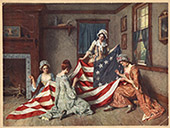Libraries, University of Nebraska-Lincoln
Document Type
Archival Material
Date of this Version
1775
Abstract
Oliver Noble (1733/4–92) was born in Hebron, Connecticut, and graduated from Yale in 1757, but stayed on as a tutor until he received his second degree in 1759. Later that same year, he was ordained a minister in South Coventry, Connecticut, but disagreements with his congregation led to his dismissal in 1761. Noble’s abilities as a preacher must have been well known, for his next installment occurred in 1762 at a church in Newburyport, Massachusetts, where he preached from the pulpit of the fifth parish until 1784. Again dismissed, Noble moved to Newcastle, New Hampshire, six months later, and there supplied the pulpit until his death in 1792.
Of his four published sermons on such topics as soteriology, the doctrine of assurance, church music, and the conflict with Great Britain, Oliver Noble’s Some Strictures upon the Sacred Story Recorded in the Book of Esther (1775)—courtesy of the American Antiquarian Society—is most memorable. The sermon was delivered in Newburyport on the fifth anniversary of the Boston Massacre (1770) and highlights the anxieties and uncertainties of the times. Noble draws his typological parallel from the Old Testament book of Esther to affirm that the events of his day were little more than a reiteration of the events typed out in Medo-Persia more than two millennia before. The biblical account of Esther relates how Haman, grand vizier of King Ahasuerus, deceives his liege and plots to massacre the Israelites of the eastern captivity for reasons of personal enrichment. However, faithful Mordecai and Queen Esther save their people from Haman’s machinations. In Noble’s adaptation of the story, King George III (Ahasuerus) is similarly deceived by the British Parliament (Haman), which tries to disenfranchise his majesty’s faithful colonists (Mordecai and Queen Esther) through the infamous Stamp Act (Haman’s injunction against the Israelites). With such obvious parallels from the Good Book, Noble thundered against Haman’s greed but also prophesied that the present crisis will soon pass over and America be vindicated in the eyes of King George.
Most interesting in this context is that Noble presented the British monarch as a benign ruler, whose cunning advisors kept him ignorant for reasons of personal enrichment. Indeed, until right up to the War, many Americans held fast to their monarch’s benign intentions and blamed parliament for the outbreak of hostilities. Noble’s typological explanation of the war should not lead us to believe for one moment that he was ignorant of its real causes. For indicative of the new age in which he lived, he furnishes his readers with statistical evidence and economic explanations (supplied in footnotes) that traced the present conflict to the insurmountable debt of Great Britain.



Comments
Introduction and an earlier version of the text were published in The Kingdom, the Power, & the Glory: The Millennial Impulse in Early American Literature (Dubuque, Iowa: Kendall-Hunt, 1998), pp. 342–359. Copyright © 1998 Reiner Smolinski.